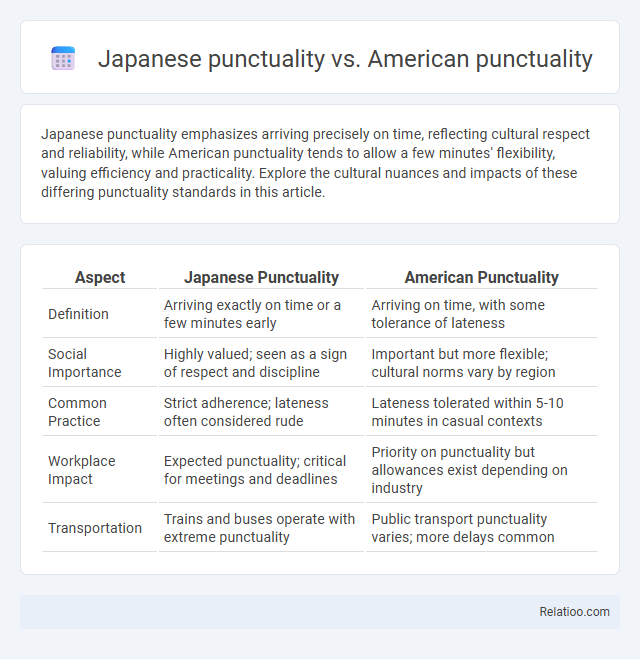Japanese punctuality emphasizes arriving precisely on time, reflecting cultural respect and reliability, while American punctuality tends to allow a few minutes' flexibility, valuing efficiency and practicality. Explore the cultural nuances and impacts of these differing punctuality standards in this article.
Table of Comparison
| Aspect | Japanese Punctuality | American Punctuality |
|---|---|---|
| Definition | Arriving exactly on time or a few minutes early | Arriving on time, with some tolerance of lateness |
| Social Importance | Highly valued; seen as a sign of respect and discipline | Important but more flexible; cultural norms vary by region |
| Common Practice | Strict adherence; lateness often considered rude | Lateness tolerated within 5-10 minutes in casual contexts |
| Workplace Impact | Expected punctuality; critical for meetings and deadlines | Priority on punctuality but allowances exist depending on industry |
| Transportation | Trains and buses operate with extreme punctuality | Public transport punctuality varies; more delays common |
Introduction to Cultural Concepts of Punctuality
Japanese punctuality is deeply rooted in societal values emphasizing respect and harmony, often resulting in trains arriving exactly on time and meetings starting promptly. American punctuality typically balances professionalism with flexibility, where being a few minutes late might be more socially acceptable depending on the context. Understanding these cultural concepts of punctuality helps you navigate expectations and demonstrate respect in cross-cultural interactions.
Historical Roots of Japanese Punctuality
Japanese punctuality stems from deep-rooted cultural values tied to harmony, respect, and collective efficiency dating back to the Edo period's strict social order and samurai code of conduct. Unlike American punctuality, which often emphasizes individualism and flexibility influenced by industrial growth and frontier mentality, Japanese society prioritizes precise timekeeping as a reflection of discipline and social responsibility. Your approach to punctuality can benefit from understanding these contrasting historical frameworks, highlighting why timing in Japan is an uncompromising social norm unlike the often more relaxed American standard.
American Attitudes Toward Time Management
American attitudes toward time management emphasize efficiency, scheduling, and meeting deadlines, reflecting a cultural value of productivity and punctuality. Unlike Japanese punctuality, which is characterized by a strict adherence to precise timing and early arrivals to show respect, American punctuality often allows for some flexibility depending on context, such as social versus professional settings. This pragmatic approach balances the need for timeliness with a focus on results and adaptability in daily routines and business practices.
Social Expectations: Japan vs. USA
Japanese social expectations emphasize strict punctuality as a sign of respect and harmony, with lateness often viewed as disrespectful. In contrast, American culture values punctuality but tends to be more flexible, allowing for some delays without severe social consequences. These differences reflect broader cultural attitudes toward time management, where Japan prioritizes collective discipline and the USA balances individual circumstances with timeliness.
Punctuality in Japanese Workplaces
Punctuality in Japanese workplaces is deeply rooted in cultural values emphasizing respect, discipline, and efficiency, often reflected by employees arriving several minutes early. In contrast to American punctuality, which typically prioritizes being on time, Japanese workers view being even slightly late as disrespectful and unprofessional. This strict adherence to timeliness contributes to Japan's reputation for reliability and productivity in global business environments.
Meeting and Event Timeliness in America
Meeting and event timeliness in America reflects a cultural emphasis on scheduled start times, though it tends to be more flexible compared to Japan's strict punctuality standards, where arriving precisely on time is crucial. American professionals value promptness to demonstrate respect and efficiency, yet minor delays are often tolerated depending on the context. Your awareness of these nuances can improve cross-cultural interactions and ensure smoother coordination during international meetings and events.
Public Transportation: A Tale of Two Systems
Japanese punctuality in public transportation is renowned for its precision, with trains famously departing and arriving on time within seconds, reflecting a deeply ingrained cultural emphasis on reliability and respect for schedules. American public transit, while improving, often faces delays due to infrastructure challenges and less stringent adherence to time, impacting the overall perception of punctuality. Your experience with punctuality in these transit systems highlights the contrast between Japan's meticulous timekeeping and America's more flexible, yet evolving, approach to public transportation schedules.
Consequences of Tardiness in Both Cultures
Tardiness in Japanese culture often leads to significant social and professional consequences, including loss of trust and strained relationships, as punctuality is viewed as a sign of respect and discipline. In contrast, American culture tends to be more lenient with punctuality, but consistent lateness may still result in perceived unprofessionalism and missed opportunities. Both cultures recognize punctuality as a critical factor in maintaining effective communication and fostering reliability in personal and professional settings.
Bridging Gaps: Navigating Cross-Cultural Differences
Japanese punctuality emphasizes strict adherence to schedules, reflecting deep respect for others' time and social harmony, while American punctuality values timeliness but often allows some flexibility based on context. Punctuality across cultures serves as a critical marker of professionalism and reliability, yet misunderstandings can arise when differing expectations collide. You can bridge gaps by recognizing these nuances, adapting your approach to timing, and fostering clear communication to navigate cross-cultural differences effectively.
Lessons Learned: Adopting Global Punctuality Standards
Japanese punctuality exemplifies precision, with trains arriving within seconds of scheduled times, reflecting a cultural commitment to respect and efficiency. American punctuality tends to be more flexible, often allowing a grace period, highlighting a balance between timeliness and practicality in diverse social and professional contexts. Your adoption of global punctuality standards can enhance reliability and trust, blending Japanese exactness with American adaptability for improved cross-cultural collaboration.

Infographic: Japanese punctuality vs American punctuality
 relatioo.com
relatioo.com